学术英语
学术英语ppt课件

学术英语的重要性
1 2
促进国际学术交流
学术英语是国际学术界的通用语言,掌握学术英 语能够使学者更好地参与国际学术交流,分享研 究成果。
提高研究质量
严谨、准确的学术语言有助于提高研究论文的质 量和说服力,使研究得到更广泛的认可。
3
增强跨文化交流能力
学术英语能够帮助学者了解不同文化背景下的学 术观点和研究方法,促进跨文化交流与合作。
。
04
学术英语听说
学术报告的听讲技巧
01
02
03
提前预习
提前了解报告的主题和背 景,有助于更好地理解报 告内容。
集中注意力
在报告过程中,尽量保持 注意力集中,避免错过重 要信息。
做笔记
对于重要的观点和数据, 及时做笔记以便后续回顾 。
学术讨论的参与技巧
提问与回答
积极参与讨论,对于不理解的问题及时提问,同 时对于别人的问题也要认真回答。
学术论文的写作技巧
逻辑清晰
组织论文结构合理,逻辑清晰,使读者易于 理解。
条理分明
分段论述,标明小标题,突出重点和层次感 。
图表辅助
利用图表、表格等形式辅助说明研究结果和 数据。
03
学术英语阅读
学术文献的查找与筛选
重要步骤
在进行学术研究时,查找和筛选合适的学术文献是至关重要的第一步。可以通过学术数据库、图书馆 、学术搜索引擎等途径查找相关文献。在筛选文献时,应关注文献的学术声誉、研究方法和结论的可 靠性。
提出观点
在讨论中积极发表自己的观点,但要确保论据充 分、逻辑清晰。
尊重他人
在讨论中要尊重他人的观点,避免过于情绪化或 攻击性的言辞。
学术演讲的表达技巧
结构清晰
《学术英语》(理科)课后答案(完整版)

ContentsUnit 1 – Astronomy (2)Part I: Pre-listening (2)Part II: While Listening (2)Text A: Fun Facts about Astronomy (2)Text B: Shenzhou-10 Mission (3)Part III: After Listening (3)Part IV: Homework (3)Unit 2 – Biology (4)Part I: Pre-listening (4)Part II: While Listening (4)Text A: Secret of Life (4)Text B: Animal Intelligence (5)Part III: After Listening (5)Part IV: Homework (5)Unit 3 – Psychology (6)Part I: Pre-listening (6)Part II: While Listening (6)Text A: Discovering Psychology (6)Text B: Liespotting (7)Part III: After Listening (7)Part IV: Homework (7)Unit 4 – Geography (8)Part I: Pre-listening (8)Part II: While Listening (8)Text A: What Is Geography? (8)Text B: Mount Kailash – Axis of the World (9)Part III: After Listening (9)Part IV: Homework (9)Unit 5 – Economy (sic) (10)Part I: Pre-listening (10)Part II: While Listening (10)Text A: The Blue Economy (10)Text B: A Monkey Economy as Irrational asOurs (11)Part III: After Listening (11)Part IV: Homework (11)Unit 6 – Physics (12)Part I: Pre-listening (12)Part II: While Listening (12)Text A: What Is Physics? (12)Text B: Science of Figure Skating (13)Part III: After Listening (13)Part IV: Homework (13)Unit 7 – Computer Science (14)Part I: Pre-listening (14)Part II: While Listening (14)Text A: Computer Software (14)Text B: Computer Science Advice forStudents (15)Part III: After Listening (15)Part IV: Homework (15)Unit 8 – Chemistry (16)Part I: Pre-listening (16)Part II: While Listening (16)Text A: The History of DiscoveringElements (16)Text B: The Periodic Table of Elements (17)Part III: After Listening (17)Part IV: Homework (17)Unit 1 – AstronomyPart I: Pre-listeningC: Listening Exercise1. D – Mars.2. C – For finding their way across hugeareas of ocean.3. C – Almost every ancient culture knewof these five mysteries.4. A – Saturn, Jupiter, Venus, Mercury andMars.5. C – The study of stars.Part II: While ListeningText A: Fun Facts about Astronomy Exercise 1 – Global Understanding1.Two branches: (1) observationalastronomy and (2) theoreticalastronomy.2.Aspects: fun facts about (3) the sun(4) the moon(5) the stars(6) the planetsExercise 2 – Listening and Note-takingThe better notes are _A_, because:1.Good notes should consist of keywordsor very short sentences, not every word.e abbreviations and symbols thatmake sense to you can help you writedown notes quickly.3.Leave space between topics or ideas soyou can scan the page more easily later. Exercise 3 – In-depth Listening1.Mercury is the (1) second smallestplanet in the solar system and has (2)no moon. It can get as hot as (3) 800 °Cand cold as (4) 300 °C below zero. Oneyear on Mercury is equal to (5) 88 dayson Earth.2.Venus is the only planet that rotatesfrom (6) east to west. A year on thisplanet is equal to (7) 225 days on Earth.3.Earth is nearly (8) 93 million miles awayfrom the sun. It takes about (9) 16million horsepower to break the Earth’sgravitational pull.4.According to scientists, in around (10) 5billion years, a day on Earth will be (11)48 hours long and somewhere duringthat time the sun will explode.5.The planet Neptune was discoveredmore than (12) 150 years ago in 1846,and since then it still has to complete anorbit around the sun, as one Neptuneyear equals to (13) 165 Earth years.6.Pluto’s size is very small which madescientists demote it to a (14) dwarfplanet status.Text B: Shenzhou-10 MissionExercise 1 – Global Understanding1.June 24th.2.China hasn’t set up a permanent spacestation.Exercise 2 – Listening for Details1.False2.True3.Not GivenExercise 3 – Compound Dictation1.blasted off2.docked3.conduct experiments4.June 20th5.gave a lecture6. a manual docking procedure7.spoke8.two-way video link9.flew around10.the modulePart III: After ListeningPart IV: HomeworkA – Listening Task1.supremacy2.gesture3.vowed4.hostile5.decade6.mission7.spotted8.It was five kilometers from base andthey were running dangerously short oftime9.The orange soil looked like evidence ofrecent volcanic activity 10.In just half an hour, Schmitt and Cernangathered all the orange soil they couldlay hands onUnit 2 – BiologyPart I: Pre-listeningA: Talk about the Topic1.Hummingbird (c); Marmoset (a); Ostrich(d); Sloth (b); Venus flytrap (g); Cheetah(f); Bamboo (h); Rafflesia (e)2.as sly as a fox; as timid as a hare; ascheerful as a lark; as silly as a goose; asgreedy as a wolf; as proud as a peacock;as strong as a horse; as brave as a lion;as gentle as a lamb; as stubborn as amule; as busy as a bee; as blind as a bat C: Listening Exercise1. D – Hostess and guest.2. B – Genetically modified organism.3. A – Corns with a 4-digit PLU code.4. C – Because there is no proof that GMfoods are safe.5. C – From PLU code on the produce. Part II: While ListeningText A: Secret of LifeExercise 1 – Global Understanding1.nucleus2.mush3.membranes4.protein5.energy6.chromosomesExercise 2 – Listening and Note-taking1.frogspawn2.divide and divide3.replicating4.specialize5.body parts6.true of us7. a single cell8.two fundamental rules of life9.made of cells10.other cells11.what life wasExercise 3 – In-depth Listening1.17th2.Robert Hooke3.microscope4.snowflakes5.natural fibers6.mid-19th7.resurfaced8.well-engineered9.exposeText B: Animal IntelligenceExercise 1 – Global Understanding1. B – To prove that dolphins are thinkingspecies.2. C – Self-awareness.Exercise 2 – Listening for Details1.True2.Not Given3.False4.True5.FalseExercise 3 – Compound Dictation1.reacting2.another dolphin3.back and forward4.testing to see5.the same things6.neck stretches7.marked part8. a mirror9. a toolPart III: After ListeningPart IV: HomeworkA – Listening Task1.filtered sunlight2.fade3.sensitive4.evaporate5.pebbles6.moist7.snippers8.start up9.indestructible10.raise alarm11.a shadier location 12.polluted water13.reddish14.decaying or mushy15.indoor environmentsUnit 3 – PsychologyPart I: Pre-listeningA: Talk about the Topic2.1-d, 2-a, 3-f, 4-g, 5-c, 6-e, 7-h, 8-b C: Listening Exercise1. B – He has just moved to a new place.2. A – He should take Fido to the vet.3. D – He will put his dog on medication.4. A – Dog emotions are quite similar tothe emotions of humans.5. C – Harry is an expert on brain scienceof humans and dogs.Part II: While ListeningText A: Discovering Psychology Exercise 1 – Global Understanding1.behavior of individuals2.mental processes3.dispositional factors4.situational factors5.experimental psychology laboratory6.Principles of PsychologyExercise 2 – Listening and Note-taking1.sci entific study2.res earch3.pred ict & (ctrl) control behav ior4.gene tic5.att itudes, ment al6.sens ory stimul ation7.rew ards, act ionsExercise 3 – In-depth Listening1.18792.Germany3.first experimental psychologylaboratory4.18836.first American psychological laboratory7.18909.psychological text10.Principles of PsychologyText B: LiespottingExercise 1 – Global Understanding1. D – He peppered his account with alittle too much detail.2. B – A fake smile will betray a liar. Exercise 2 – Listening for Details1.Not Given2.False3.False4.True5.FalseExercise 3 – Compound Dictation1.lower2.pause3.pepper4.detail5.chronological6.backwards7.words8.gesturesPart III: After ListeningPart IV: HomeworkA – Listening Task1.signs of the condition2.low levels of light3.severe form4.thoughts of death or suicide5.designed6.sleep7.active8.sugary water9.more depressed10.least11.blue and white light12.dim red 13.signals14.natural sleep-wake cycle15.recommendation16.exposure17.bluish18.reddishUnit 4 – GeographyPart I: Pre-listeningA: Talk about the Topic1.a. 4.5 to 4.6 billion yearsb.149,597,870 kmc.384,403.1 kmd.Mt. Everest, Asia: 8844.43 me.Dead Sea: -422 mf.Mariana Trench, Western PacificOcean: 11,034 mg.56.7°C (Greenland Ranch in DeathValley, California, July 10, 1913)h.-89.2°C (Vostok, Antarctica, July 21,1983)2.1-a; 2-c; 3-f; 4-b; 5-e; 6-d; 7-gC: Listening Exercise1. D – New Zealand.2. C – The south of the country can bewarm in summer.3. C – A map showing geographicalfeatures.4. B – The coverage of oceans.5. C – She wants to know more aboutgeography.Part II: While ListeningText A: What Is Geography?Exercise 1 – Global Understanding1.Cultural geography focusing on peopleand cultures.2.Physical geography focusing on planetEarth. Exercise 2 – Listening and Note-takingFive these of geographyA. LocationB. PlaceC. Human-environment Interaction1. Humans depend on the environment2. Humans modify the environment3. Humans adapt to the environmentD. MovementE. Region1. Formal regions2. Functional regions3. Vernacular regionsExercise 3 – In-depth Listening1.earth2.to write3.climates4.plant and animal distributionputerized mapping6.data analysisText B: Mount Kailash – Axis of the World Exercise 1 – Global Understanding1. A – Because it matches the legend ofthe axis of the world.2. D – Because it is the most importantpilgrimage site in Tibet.Exercise 2 – Listening for Details1.False2.True3.Not Given4.False5.FalseExercise 3 – Compound Dictation1.pilgrimage site2.Buddha’s e nlightenment3.newly dressed altar4.prayer flags5.end up straight6.wind horsesPart III: After ListeningPart IV: HomeworkA – Listening Task1.233 countries2. a bit ambiguous3.semi-presidential republic4.6,592,800 square miles5.northern part of Asia6.11 different time zones7.climate conditions8.energy and minerals9.greatest forest reserves10.unfrozen freshwater11.ninth most populous12.lungs of Europe13.by volume 14.780 species of birds15.third largest economy16.fastest aging country17.Three Gorges Dam18.at a country’s disposalUnit 5 – Economy (sic)Part I: Pre-listeningA: Talk about the Topicpete with one another; positive; aninvisible hand2. a long time; stall along the wayC: Listening Exercise1. B – He is interested in making modelboats.2. C – She is considerate and thoughtful.3. A – It will help children learn the valueof money.4. D – He will give Jacky a regularallowance soon.5. D – Saving money for larger costs willhelp children learn how to budget. Part II: While ListeningText A: The Blue EconomyExercise 1 – Global Understanding1.expensive2.not smart3.creative4.healthy and happy5.what we did not know we have Exercise 2 – Listening and Note-taking1.healthy and naturalanic3.solar energy4.biodegradable5.palm oil6.destroy the rain forest7.subsidies8.tax moneypete with food10.damaging the climate11.expensive12.not smartExercise 3 – In-depth Listening1.Not Given2.True3.False4.TrueText B: A Monkey Economy as Irrational as OursExercise 1 – Global Understanding1. D – When they are facing a loss.2. A – People are irrational because theywant to make more money.Exercise 2 – Listening for Details1.10002.10003.04.5005.Play it safe6.20007.10008.09.50010.Take a riskExercise 3 – Compound Dictation1.different directions2.good or not3.switch4.loss mindset5.risky6.worrying7.losing stocks longer8.sell their housePart III: After ListeningPart IV: HomeworkA – Listening Task1.economic prosperity2.support strengthening3.premier forum4.lowering tariffs5.non-discriminatory6.greater participation7.integrated economic community8.critical energy sector9.interconnectivity10.renewablepletion of negotiations12.far-reaching trade agreement13.rules-based and high-standard14.mere short term15.multilaterial and bilateral partnershipsUnit 6 – PhysicsPart I: Pre-listeningA: Talk about the Topic1.1-f; 2-b; 3-e; 4-d; 5-g; 6-a; 7-h; 8-c C: Listening Exercise1. B – They are doing a physicalexperiment.2. C – Six.3. D – Judy helped to pinch the balloontight.4. B – Mike is very smart.5. A – They pumped some gas into theballoon.Part II: While ListeningText A: What Is Physics?Exercise 1 – Global UnderstandingTwo categories of physics:(1) Classical physics(2) Modern physicsMain purposes of learning physics:(1) To understand the world around people(2) To explain the universe at large Exercise 2 – Listening and Note-taking1.Definition2.motion of matter3.space and time4.energy5.force6.effects7.philosophy8.world9.classical10.modern11.Applications12.electromagnetism13.mechanics14.quantum physics Exercise 3 – In-depth Listening1.matter moves2.object attraction3.heat and energy4.mass-energy5.space-time6.electric chargesText B: Science of Figure Skating Exercise 1 – Global Understanding1. C – The science of figure skating.2. D – All of the above.Exercise 2 – Listening for Details1.False2.False3.True4.Not Given5.FalseExercise 3 – Compound Dictation1.action and reaction2.vertical velocity3.velocity4.higher5.spin6.extended7.slowly8.closer9.faster10.following11.Conservation of Angular Momentum Part III: After ListeningPart IV: HomeworkA – Listening Task1.powered by sun light2.20153.63 meters across4.200 square meters5.cells6.140 kilometers7.8,500 meters8.stops9.20 to 2510.autopilot 11.goal12.appliancesUnit 7 – Computer SciencePart I: Pre-listeningA: Talk about the Topic1.1-Wechat; 2-MSN; 3-Tencent QQ; 4-Sina Microblog; 5-Renren Network; 6-Instagram2.MSN, Tencent QQ, Renren Network,Sina MNicroblog, Instagram, Wechat C: Listening Exercise1. D – A research on the applications ofcomputers and Internet.2. C – Playing computer games.3. B – Computers can help edit jobapplication documents.4. C – Online shopping has become anessential part of our life.5. A – People may be cheated by someoneonline.Part II: While ListeningText A: Computer SoftwareExercise 1 – Global Understanding1. D – Software programs and theoperating system.2. B – A set of instructions that tells thecomputer what to do.Exercise 2 – Listening and Note-taking1.most of us don’t speak the ir language2.is like a translator3.the computer what to do4.personalized5.Mac6.Linux7.Operating system8.Software programs9. a computer store10.download from the InternetExercise 3 – In-depth Listening1.True2.FalseAn operating system can cover thebasics from saving files to fixingproblems.3.FalseYou can get computer software from acomputer store or download them fromthe Internet without the help ofcomputer engineers4.FalseSoftware programs can makecomputers personalized5.TrueText B: Computer Science Advice for StudentsExercise 1 – Global Understanding1. C – Advice for students on computerscience.2. A – Computer science is highlyinteractive.Exercise 2 – Listening for Details1.False2.True3.True4.Not GivenExercise 3 – Compound Dictation1.fallacies/misconceptions2.programming3.people4.business analysts5.discuss6.solve7.logical thinking8.capture things9.articulate10.connectingPart III: After ListeningPart IV: HomeworkA – Listening Task1.index of the web2.software programs3.webpages4.follow all the links5.chunk of the web6.hit return7.possible8.contain your keywords9.directly adjacent 10.spamming11.outside links point to itmitment13.impartial search results14.a snippet of the text15.related searches16.advertising business17.strive to18.cheetah’s top running speedUnit 8 – ChemistryPart I: Pre-listeningA: Talk about the Topic1.A, C, and E are chemical reactionsC: Listening Exercise1. A – In 1828.2. D – He created them from twoinorganic substances.3. C – People isolated it from living things.4. C – It proved that organic substancescan be created from inorganicsubstances.5. D – Atoms.Part II: While ListeningText A: The History of Discovering ElementsExercise 1 – Global Understanding1.diversity of natureplexity of man3.92 elements4.the most important codes5.making of the modern world Exercise 2 – Listening and Note-taking1.what an element is2.lead, copper, gold, silver, iron, mercury,tin3.metals4.earth, air, fire, and water5.16th6.metals into goldExercise 3 – In-depth Listening1.attempted2.electricity3.natural4.ultimately5.insight6.physics7.mysteries8.detective9.centuries10.struggled11.fascination12.destructionText B: The Periodic Table of Elements Exercise 1 – Global Understanding1. B – How the periodic table of elementswas discovered and its significance.2. B – It changes the way that everyonewould learn and understand theelements.Exercise 2 – Listening for Details1.True2.False3.Not Given4.True5.FalseExercise 3 – Compound Dictation1.18692.explain3.properties4.similarities5.patterns6.vertical7.resembled8.existence and properties9.rightPart III: After ListeningPart IV: HomeworkA – Listening Task1.green leaves2.grows underground3.for their taste4.traditionally for health reasons5.seeking to lose weight6.desire to eat7.reduce hunger8.Over six weeks9.each group 10.three-tenths of a gram11.normally eat12.especially true13.may be lost14.extend the effectiveness15.a tropical plant16.its medical possibilities17.earlier evidence18.brains of patients19.sixty to ninety-three years old20.rarely or never。
试论学术英语在大学外语教学中的重要性
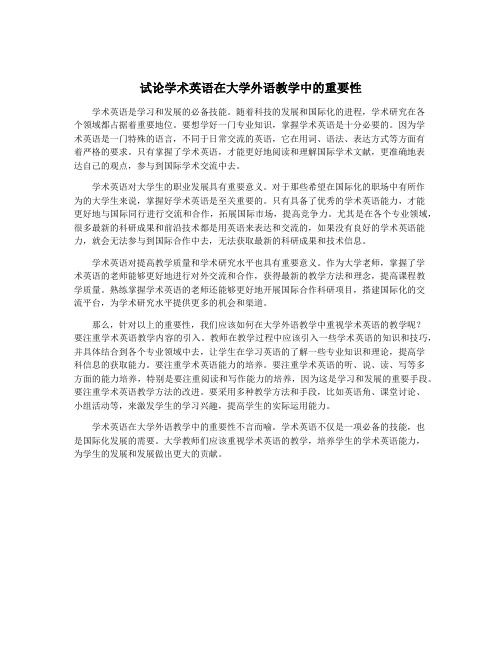
试论学术英语在大学外语教学中的重要性学术英语是学习和发展的必备技能。
随着科技的发展和国际化的进程,学术研究在各个领域都占据着重要地位。
要想学好一门专业知识,掌握学术英语是十分必要的。
因为学术英语是一门特殊的语言,不同于日常交流的英语,它在用词、语法、表达方式等方面有着严格的要求。
只有掌握了学术英语,才能更好地阅读和理解国际学术文献,更准确地表达自己的观点,参与到国际学术交流中去。
学术英语对大学生的职业发展具有重要意义。
对于那些希望在国际化的职场中有所作为的大学生来说,掌握好学术英语是至关重要的。
只有具备了优秀的学术英语能力,才能更好地与国际同行进行交流和合作,拓展国际市场,提高竞争力。
尤其是在各个专业领域,很多最新的科研成果和前沿技术都是用英语来表达和交流的,如果没有良好的学术英语能力,就会无法参与到国际合作中去,无法获取最新的科研成果和技术信息。
学术英语对提高教学质量和学术研究水平也具有重要意义。
作为大学老师,掌握了学术英语的老师能够更好地进行对外交流和合作,获得最新的教学方法和理念,提高课程教学质量。
熟练掌握学术英语的老师还能够更好地开展国际合作科研项目,搭建国际化的交流平台,为学术研究水平提供更多的机会和渠道。
那么,针对以上的重要性,我们应该如何在大学外语教学中重视学术英语的教学呢?要注重学术英语教学内容的引入。
教师在教学过程中应该引入一些学术英语的知识和技巧,并具体结合到各个专业领域中去,让学生在学习英语的了解一些专业知识和理论,提高学科信息的获取能力。
要注重学术英语能力的培养。
要注重学术英语的听、说、读、写等多方面的能力培养,特别是要注重阅读和写作能力的培养,因为这是学习和发展的重要手段。
要注重学术英语教学方法的改进。
要采用多种教学方法和手段,比如英语角、课堂讨论、小组活动等,来激发学生的学习兴趣,提高学生的实际运用能力。
学术英语在大学外语教学中的重要性不言而喻。
学术英语不仅是一项必备的技能,也是国际化发展的需要。
学术英语综合ppt课件
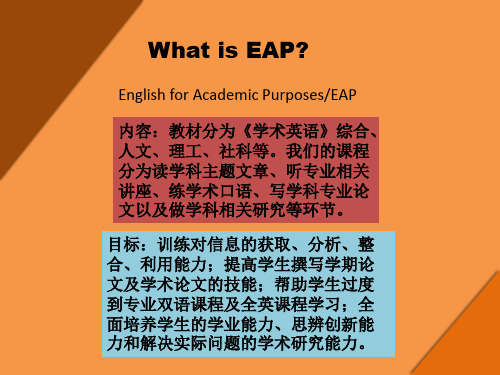
4. Speaking • Ask for information and clarification in a
polite and effective way • Learn to do interviews and report the
findings in an oral presentation
What is EAP?
English for Academic Purposes/EAP
内容:教材分为《学术英语》综合、 人文、理工、社科等。我们的课程 分为读学科主题文章、听专业相关 讲座、练学术口语、写学科专业论 文以及做学科相关研究等环节。
目标:训练对信息的获取、分析、整 合、利用能力;提高学生撰写学期论 文及学术论文的技能;帮助学生过度 到专业双语课程及全英课程学习;全 面培养学生的学业能力、思辨创新能 力和解决实际问题的学术研究能力。
Unit 1
Economics
Unit Contents
Unit objectives Text A Text B Text C Academic language and discourse Listening Speaking Writing
Unit 1
Economics
Unit Objectives
acquire some specialized vocabulary of economics • Understand the functions of parenthetical statements • Comprehend stylistic differences between formal and informal English and acquire some formal expressions
学术英语第二版理工

学术英语第二版理工简介《学术英语第二版理工》是一本致力于帮助理工科学生提高学术英语能力的教材。
本教材包含了丰富的例句和练习,涵盖了理工科常见的学术英语用语和表达方式。
通过学习本教材,学生能够提高自己的写作、阅读和口语能力,提升在学术领域的表达能力。
内容概述《学术英语第二版理工》的内容主要分为以下几个部分:1. 理工科学术写作基础本部分将介绍理工科学术写作的基本要素,包括论文结构、段落结构、句子结构等。
通过学习这些基础知识,学生能够写出更规范和条理清晰的学术文章。
2. 学术英语常用词汇本部分将介绍理工科学术写作中经常使用的单词和短语,包括专业名词、动词短语、形容词短语等。
学生可以通过掌握这些常用词汇,提高自己在学术领域的表达能力。
3. 学术英语表达技巧本部分将介绍一些学术英语的表达技巧和注意事项,包括如何正确引用他人的观点、如何写出精确的推理和论证等。
学生通过学习这些技巧,可以提高自己的学术写作水平。
4. 学术英语阅读技巧本部分将介绍一些学术英语阅读的技巧,包括如何快速找到重点内容、如何理解长难句等。
通过学习这些技巧,学生能够更高效地阅读学术文献,并理解其中的内容。
5. 学术英语口语表达本部分将介绍一些学术英语口语表达的技巧和习惯用法,包括如何用简洁明了的语言介绍自己的研究项目、如何进行学术交流等。
学生通过学习这些技巧,可以提高自己的学术口语能力。
学习方法学生可以按照以下步骤来学习《学术英语第二版理工》:1.阅读教材并做练习:学生可以按照章节顺序逐一阅读教材,同时完成每个章节后的练习。
通过练习,学生可以巩固所学知识。
2.多写作练习:学生可以选择一些学术主题进行写作练习。
通过多写作练习,学生可以提高自己的学术写作水平。
3.多阅读学术文献:学生可以选择一些与自己研究领域相关的学术文献进行阅读。
通过阅读学术文献,学生可以提高自己的学术阅读能力。
4.参加学术讨论和演讲:学生可以参加学术讨论和演讲活动,与他人进行学术交流。
学术英语词汇大全
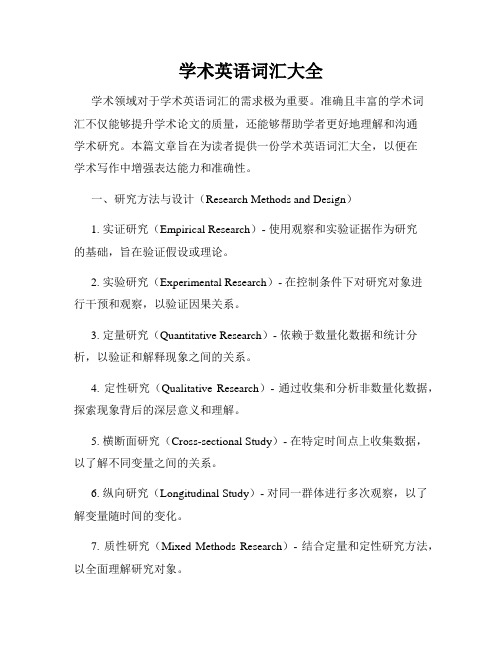
学术英语词汇大全学术领域对于学术英语词汇的需求极为重要。
准确且丰富的学术词汇不仅能够提升学术论文的质量,还能够帮助学者更好地理解和沟通学术研究。
本篇文章旨在为读者提供一份学术英语词汇大全,以便在学术写作中增强表达能力和准确性。
一、研究方法与设计(Research Methods and Design)1. 实证研究(Empirical Research)- 使用观察和实验证据作为研究的基础,旨在验证假设或理论。
2. 实验研究(Experimental Research)- 在控制条件下对研究对象进行干预和观察,以验证因果关系。
3. 定量研究(Quantitative Research)- 依赖于数量化数据和统计分析,以验证和解释现象之间的关系。
4. 定性研究(Qualitative Research)- 通过收集和分析非数量化数据,探索现象背后的深层意义和理解。
5. 横断面研究(Cross-sectional Study)- 在特定时间点上收集数据,以了解不同变量之间的关系。
6. 纵向研究(Longitudinal Study)- 对同一群体进行多次观察,以了解变量随时间的变化。
7. 质性研究(Mixed Methods Research)- 结合定量和定性研究方法,以全面理解研究对象。
二、文献综述和理论框架(Literature Review and Theoretical Framework)1. 学术论文(Academic Paper)- 详细描述研究问题、方法、结果和结论的学术文章。
2. 文献综述(Literature Review)- 对已有文献进行全面评估和分析,以支持研究问题和方法的选择。
3. 引用文献(Citation)- 在学术论文中使用其他作者的观点、理论或研究结果时,提供出处和参考文献列表的方法。
4. 理论框架(Theoretical Framework)- 在学术研究中构建理论模型或概念框架,以解释和解决研究问题。
理工专业通用学术英语. 基础篇
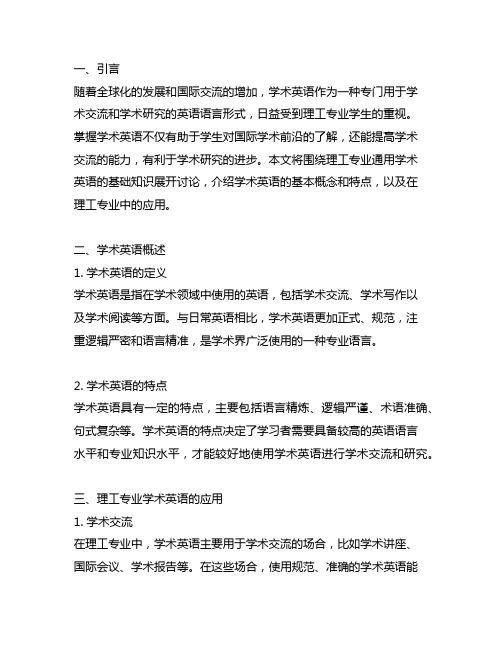
一、引言随着全球化的发展和国际交流的增加,学术英语作为一种专门用于学术交流和学术研究的英语语言形式,日益受到理工专业学生的重视。
掌握学术英语不仅有助于学生对国际学术前沿的了解,还能提高学术交流的能力,有利于学术研究的进步。
本文将围绕理工专业通用学术英语的基础知识展开讨论,介绍学术英语的基本概念和特点,以及在理工专业中的应用。
二、学术英语概述1. 学术英语的定义学术英语是指在学术领域中使用的英语,包括学术交流、学术写作以及学术阅读等方面。
与日常英语相比,学术英语更加正式、规范,注重逻辑严密和语言精准,是学术界广泛使用的一种专业语言。
2. 学术英语的特点学术英语具有一定的特点,主要包括语言精炼、逻辑严谨、术语准确、句式复杂等。
学术英语的特点决定了学习者需要具备较高的英语语言水平和专业知识水平,才能较好地使用学术英语进行学术交流和研究。
三、理工专业学术英语的应用1. 学术交流在理工专业中,学术英语主要用于学术交流的场合,比如学术讲座、国际会议、学术报告等。
在这些场合,使用规范、准确的学术英语能够更好地表达自己的观点和研究成果,与国际同行进行有效的交流。
2. 学术写作学术英语在理工专业中也广泛应用于学术论文、学术报告等的撰写。
学术写作需要具备严谨的逻辑思维能力和精准的语言表达能力,同时还需要掌握学术英语的句式结构和表达方式,才能够撰写出高质量的学术作品。
3. 学术阅读作为理工专业的学生,学术阅读是十分重要的技能。
在学术阅读过程中,学生需要理解并掌握学术英语中的专业术语、学术理论以及学术研究方法等内容,从而为自己的学术研究提供支持和参考。
四、学术英语的学习方法1. 词汇积累学术英语的词汇量相对较大,涉及到各个学科的专业术语和概念。
学生需要通过大量的阅读和学习,积累专业术语和表达方式,才能够熟练地运用学术英语进行学术交流和写作。
2. 句式结构学术英语的句式结构相对复杂,包括倒装句、定语从句、状语从句等。
学生需要通过大量的阅读和写作练习,熟练掌握学术英语的句式结构,从而能够准确、流畅地表达学术观点和研究成果。
学术英语课程介绍
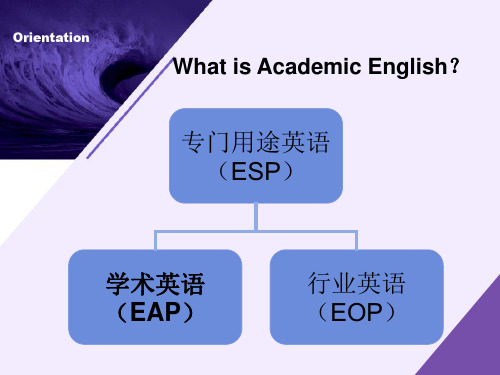
Unit 3 Orientation
Orientation
2. Why?
由于英语已成为国际各学科的研究成果进行交流,以及科技 经济文化交流的国际通用语(lingua franca),ESP就成为 了当今世界上高校为非英语专业学生开设的核心课程。 Ypsilandis 和Kantaridou(2007)对欧洲奥地利、法国、德 国、希腊、意大利、瑞典、西班牙、瑞士等国28所高校现状 调查,发现其中83.3% 的高校ESP英语课程是必修课。在亚 洲,连教学语言为非英语的日本、韩国和我国台湾的高校大 学英语也基于以ESP为主流课程。
Unit 3 Orientation
3. 15% 演示科研成果 Oral presentation
1).时间安排参照进度表 2).1~2人一组 3).基于本Байду номын сангаас材所授技能 4).主题(参见说明-主题1)
5).每位学生陈述时间至少3分钟
6).不接受单纯读稿
7).每位学生单独得分
说明: Unit 3
Orientation
• From Wikipedia, the free encyclopedia • /wiki/English_for_specific_purpos es
What is EAP
• English for academic purposes (EAP) entails training students, usually in a higher education setting, to use language appropriately for study. It is a challenging and multi-faceted area within the wider field of English language learning and teaching (ELT), and is one of the most common forms of English for specific purposes (ESP).
- 1、下载文档前请自行甄别文档内容的完整性,平台不提供额外的编辑、内容补充、找答案等附加服务。
- 2、"仅部分预览"的文档,不可在线预览部分如存在完整性等问题,可反馈申请退款(可完整预览的文档不适用该条件!)。
- 3、如文档侵犯您的权益,请联系客服反馈,我们会尽快为您处理(人工客服工作时间:9:00-18:30)。
词义猜测2003年第54题Railroads justify rate discrimination against captive shippers on the grounds that in the long run it reduces everyone’s cost. If railroads charged all customers the same average rate, they argue, shippers who have the option of switching to trucks or other forms of transportation would do so, leaving remaining customers to shoulder the cost of keeping up the line. It’s a theory to which many economists subscribe, but in practice it often leaves railroads in the position of determining which companies will flourish and which will fail.“Do we really want railroads to be the arbiters of who wins and who loses in the marketplace?”asks Martin Bercovici, a Washington lawyer who frequently represents shippers.The word“arbiters”most probably refers to those_________.[A] who work as coordinators[B] who function as judges[C] who supervise transactions[D] who determine the price该题的解题关键在于是否知道arbiters后的介宾短语of who wins and who loses in the marketplace就是对该词的最准确定义,依据该介宾短语,不难得出arbiters是决定谁输谁赢的人,四个选项中只有B选项和这个意思最为接近。
再例:2004年第43题For any job search, you should start with a narrow concept—what you think you want to do —then broaden it.“None of these programs do that,”says another expert.“There's no career counseling implicit in all of this.”Instead, the best strategy is to use the agent as a kind of tip service to keep abreast of jobs in a particular database; when you get E-mail, consider it a reminder to check the database again.“I would not rely on agents for finding everything that is added to a database that might interest me,”says the author of a job-searching guide.The expression“tip service”most probably means .[A] advisory[B] compensation[C] interaction[D] reminder该题的解题关键在于充分利用分号,分号前面的短语use the agent as a kind of tip service 和分号后的consider it a reminder属于并列关系,it和the agent都是指的文章中所说的搜索代理,自然我们就找到了tip service的同义词reminder。
所以该题答案D。
根据考研英语阅读理解词义题破解的总体原则,可以总结出两种具体的词义题解题方法:1、内在逻辑关系法即根据内在逻辑关系推测词义是指运用语言知识分析和判断相关信息之间存在的逻辑关系,然后根据逻辑关系推断生词词义或大致义域。
a. 根据对比关系猜测词义在一个句子或段落中,有对两个事物或现象进行对比性的描述,我们可以根据生词或难词的反义词猜测其词义。
例如:Andrew is one of the most supercilious men I know. His brother, in contrast, is quite humble and modest.该例中supercilious对许多人来说可能是个生词,但是句中短语in contrast,(相对照的,相对比的)可以提示我们supercilious和后面词组humble and modest(谦卑又谦虚)是对比关系。
分析出这种关系后,我们便能猜出supercilious意为“目空一切的,傲慢的”。
表示对比关系的词汇和短语主要是unlike,not,but,however,despite,in spite of,in contrast和while引导的并列句等。
例如,A good supervisor can recognize instantly the adept workers from the unskilled ones.该句中并未出现上面提到的表示对比关系的词或短语,但是通过上下文可以判断出句子前后是对比关系,即把熟练工人与非熟练工人区分开。
这时我们也能够推断出生词adept的词义为“熟练的”。
b. 根据比较关系猜测词义同对比关系相反,比较关系表示意义上的相似关系。
例如:Green loves to talk,and his brothers are similarly loquacious.该句中副词similarly表明短语loves to talk与生词loquacious之间的比较关系。
以此可以推断出loquacious词义为“健谈的”。
表示比较关系的词和短语主要是similarly,like,just as,also等。
c. 根据因果关系猜测词义在句子或段落种,若两个事物、现象之间构成因果关系,我们可以根据这种逻辑关系推知生词词义。
例如:Tom is considered an autocratic administrator because he makes decisions without seeking the opinions of others.根据原因状语从句的内容,我们可以推断出生词autocratic指“独断专行的”。
There were so many demonstrators in the Red Square that he had to elbow his way through the crowd.此句为结果状语从句,根据从句的描述“许多示威者”,我们便可推知elbow的词意“挤,挤过”。
d. 根据同义词的替代关系猜测词义在句子或段落种,我们可以利用熟悉的词语,根据语言环境推断生词词义。
例如:Although he often had the opportunity, Mr. Tritt was never able to steal money from a customer. This would have endangered his position at the bank, and he did not want to jeopardize his future.作者为避免重复使用endanger一词,用其同义词jeopardize来替代它,由此推知其词义为“使……陷入危险,危及、危害”。
Doctors believe that smoking cigarettes is detrimental to your health. They also regard drinking as harmful.句中detrimental是个生词,但判断出harmful替代detrimental后,不难推断出其词义为“不利的,有害的”。
2、外部相关因素法外部相关因素是指篇章(句子或段落)以外的其他知识。
有时仅靠分析篇章内在逻辑关系无法猜出词义。
这时就需要运用生活经验和普通常识确定词义。
例如:Husband:It’s really cold out tonight. Wife: Sure it is. My hands are practically numb. How about lighting the furnace? 根据生活经验,天气寒冷时,手肯定是“冻僵的,冻得麻木的”。
The snake slithered through the grass. 根据有关蛇的生活习性的知识,我们可以推断出slither词义为“爬行”。
在猜测词义过程中,除了使用上面提到的一些技巧,我们还可以依靠构词方面的知识,从生词本身猜测词义。
此外利用词缀亦不失为一种有效的手段。
a. 根据前缀猜测词义例如:He fell into a ditch and lay there, semiconscious, for a few minutes.根据词根conscious(清醒的,有意识的),结合前缀semi(半,部分的,不完全的),我们便可猜出semiconscious词义“半清醒的,半昏迷的”。
I’m illiterate about such things.词根literate意为“有文化修养的,通晓的”,前缀il表示否定,因此illiterate指“一窍不通,不知道的”。
b. 根据后缀猜测词义例如:Insecticide is applied where it is needed.后缀cide表示“杀者,杀灭剂”,结合大家熟悉的词根insect(昆虫),不难猜出insecticide 意为“杀虫剂”。
Then the vapor may change into droplets.后缀let表示“小的”,词根drop 指“滴,滴状物”。
